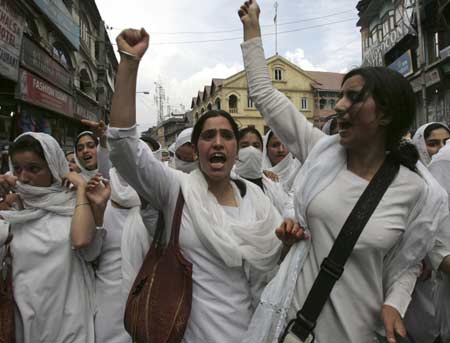
Friday, 31 Aug 2012 at 02:47
Raheela Saleem Narchoor
The Kashmir issue is, essentially, my own story. During my stay outside Kashmir I, often reluctantly, have been involved with many conversations and discussions on Kashmir. Almost all people with whom I converse believe that Kashmiri women have no say about the region they belong to. They have been ignored in taking active part in almost all discussions ranging from human rights violations to religion issues. “Why don’t Kashmiri women speak about their experiences? Why are they silent?” There hasn’t been a single day when I am not faced with questions like these.
As a native Kashmiri, I accept the criticism of those who look at Kashmir from the outside. But how can I make a simple point in a rabidly patriarchal debate? For instance, not a single male power-holder, like the leaders in the central government or the leaders in the state government or the leaders of the separatist parties or the male activists of all shades of opinion and ideologies or even the much discredited male symbol of the state–the uniformed security personnel–No ONE, No MALE–has ever asked a Kashmir woman this simple question: “What is your position/stand/opinion on self-determination?”
Unfortunately, this absence of women’s voices prevails in most social, legal, political and religious discourses. In Kashmir women are considered uninterested in politics or because the gentleness of women’s nature is presumed not to have a political opinion. Overall, women in Kashmir are considered less capable of taking part in the political game. All these ideas add up to distance and, indeed, exclude women from political discussions. Even the male political discourses uses “naturalistic” arguments derived from values and rules associated with the public and private sphere.
While Islam is characterised as a strategy of exclusion used by mainstream political entities in most Muslim countries, Islam has been used, paradoxically, by women of Kashmir as a strategy of resistance. Kashmiri women use Islam as a strategy to minimize the effects of seclusion. The practice of covering whole body, as per religious mandate, by activists of the prominent women separatist party, Dukhtaran-i-Millat (DM), of Kashmir may be interpreted as the use of Islam to conquer the public sphere. By drawing attention to their devoutness of faith, Kashmiri Muslim women have been able to breach the barriers to their participation in the public sphere. For many other women, the affirmation of their obedience to God frees them from the ascendancy of the men who hold positions of power in their lives. Islam, therefore, becomes a strategy for some women to participate actively in political system. For instance, in Kashmir, the main women separatists parties like Muslim KhwaMuteen Markaz (MKM) and DM are based on the Islamic mandates. Though these political groups carry their own opinions, these opinions are mainly based on certain pre-conceived notions of religion.
The use of religion as a strategy of resistance is seen as a double edged sword, as it allows immediate political recognition and an apparently to legitimize incursion into the male public sphere. However, using Islam as a strategy of resistance may have a good impact on Muslim women participation in politics in various Muslim states;but, in conflict ridden situations like Kashmir it may have devastating consequences. This may radicalise the ideologies held by various women due to the peer group pressure. Setting goals based on particular ideology do not give chance to reflect from secular and democratic perspective. For instance, the proclamation of the DM to fight for equal rights within the frame of Islamcreate an atmosphere of biasness and partiality for the inclusive participation of women from all three parts of Jammu and Kashmir. Similarly, the inclination of MKM towards Pakistan, solely because Pakistan is a Muslim state, makes one to ponder the outcome of the secular political mandate of such organisation.
In limited terms the mainstream discussion on Kashmir is restricted between Kashmir men and the Indian government. Womenhave always seen from the prism of victimization,ignoring the crucial part of their political consciousness and, therefore, have been isolated from the mainstream politics.The situation of Kashmiri women will not improve by just labelling them the worst victim of violence; they need to be involved in almost all political negotiations on Kashmir. Therefore, great deal needs to be done to make the women politically visa-vis secularly active in Kashmir. As long as the Kashmiri women’s movement does not strengthen and widen its secular and political base, the women of Kashmir will never be free from the dictate of a conservative society and will continue to suffer intellectually as well as morally.
The author is working with Amnesty International. She can be mailed at Raheela.Narchoor@amnesty.org.in
Related articles
- Conflict Trauma in Kashmir Hinders Childbearing (kashmirsolidaritymumbai.wordpress.com)
- India- Why #Independence is #blackday15august – Killing Kashmir (kractivist.wordpress.com)

















[…] Choti Azadi for Kashmiri Women (kashmirsolidaritymumbai.wordpress.com) […]
[…] Choti Azadi for Kashmiri Women […]
Why is there no mention of the Kashmiri Hindu ( pandit) women? Don’t they qualify as Kashmiri? The trauma of having to leave their homes and hearths behind has been traumatic for them.What do they feel about living as refugees in their own land? The author ought